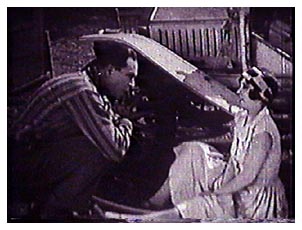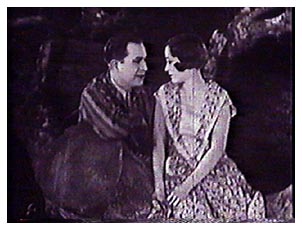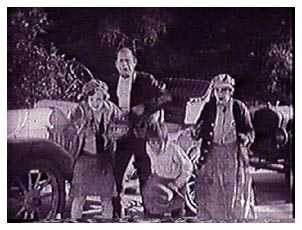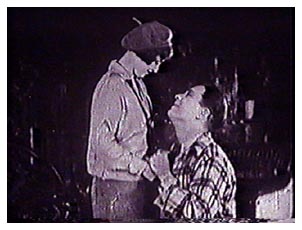

Cecil B. DeMille Pictures
Cast: Bessie Love (Mary Ellen Stack), Erwin Connelly (Pa Stack), Junior Coghlan (Charlie Stack), May Robson (Ma Stack), Harrison Ford (Bill James), John Patrick (Dudley Black).

The Stack family of New York has just received an official notice bearing bad news - their California house is going to be sold for the back taxes that are owed on it. Daughter Mary Ellen (played by Bessie Love) suggests they all pull up stakes, go to California, pay the taxes and live in the home there. "We'll sell the furniture, buy an auto, and roll to California on rubber tires," she says with enthusiastic determination. After selling "all of the family antiques except Pa," Mary Ellen buys a dilapidated "four cylinder Tourist" from a very expressive Jewish junk dealer (unfortunately unbilled) who has to dig it out from under a ton of other junk on his lot.
The scene now shifts to the office of the Tourist Motor Company. The executives are planning a huge ad campaign built around the first car the company ever made. They decide to put up billboards all over the country offering a $10,000 reward for this car. Of course, this is the same car just purchased by our heroine. So, with all their worldly belongings packed in the "new" car, Mary Ellen, Pa, Ma and little brother Charlie leave New York and begin their cross-country journey, unaware of the value of their new acquisition.
Meanwhile, Bill James has just received a promotion in his
job at the Berkshire Oil Company in Pennsylvania and goes to the
local lunch counter to celebrate -- and who should be at the lunch
counter but Mary Ellen and her family. Bill used to be their neighbor,
and, more to the point, he was Mary Ellen's lover until they had
a spat. Once Bill finds out that  Mary
Ellen is on her way to California, he decides he's still smitten,
and that's where he wants to go, too. She is not happy about this
and gathers the family together to leave. Enterprising Bill runs
to a local garage and purchases a car to follow them, but it has
no motor! Undeterred, he ropes his heap to a passing car and begins
his merry pursuit.
Mary
Ellen is on her way to California, he decides he's still smitten,
and that's where he wants to go, too. She is not happy about this
and gathers the family together to leave. Enterprising Bill runs
to a local garage and purchases a car to follow them, but it has
no motor! Undeterred, he ropes his heap to a passing car and begins
his merry pursuit.
However, Bill is not the only one after Mary Ellen Stacks. The little old junk dealer spots one of the billboards and, to his dismay, realizes he sold a car that could have brought him $10,000! He sets out to find the Stack family, too.
The rest of the movie is a series of hilarious misadventures along the winding road to California. At an auto camp, Mary Ellen meets Dudley Black who Pa says won a "he-beauty contest." Dudley, who is going to California to become a Hollywood star, becomes Bill's rival for Mary Ellen's affections, adding an entertaining subplot to the story. Later, at another auto camp (the "Kosy Kamp in Kolorado") Pa trades the open-aired Tourist to a Mexican couple for their large, closed-in touring car which is almost as dilapidated. Bill, Dudley, the Stack family and the junk dealer converge at the auto camp. Each has their own reason for pursuing the hapless couple in the valuable car. It looks like they will never see the $10,000 heap again. A lot happens to this traveling band before they reach their sunny destination. The Stacks have a flat tire, get stuck in the mud, break down several times and are robbed by some road agents who take the money that was to pay their back taxes on the house. Plus, there is a finale that includes a wild ride down a mountainside -- with no brakes -- and a long-awaited physical showdown between rivals Dudley and Bill!
"Rubber Tires" is an entertaining little programmer
that fell in between two of Bessie Love's biggest hits, "The
Lost  World" (First National, 1925)
and "Broadway Melody" (M-G-M, 1929). Although she makes
a lovely heroine, she is not given much to do in the film except
require constant rescuing by Harrison Ford -- which is not a bad
thing. There is plenty of energetic interaction, everything from
untangling her foot from a bicycle wheel to chasing her down a
mountainside in a runaway, brakeless car. Miss Love was one of
those stars who would have a big hit and then make several lesser
movies in a row, such as "Rubber Tires," before the
next big hit. As Joe Franklin observed in Classics of the Silent
Screen: A Pictorial Treasury (Citadel, 1959), "She seemed
to be forever on the threshold of top stardom but never quite
made it." As an indication of the importance Love herself
placed on this film, in her autobiography (From Hollywood With
Love, Elm Tree Books, 1977), she only gave it a passing mention
noting, " . . . not an important picture, but great fun."
World" (First National, 1925)
and "Broadway Melody" (M-G-M, 1929). Although she makes
a lovely heroine, she is not given much to do in the film except
require constant rescuing by Harrison Ford -- which is not a bad
thing. There is plenty of energetic interaction, everything from
untangling her foot from a bicycle wheel to chasing her down a
mountainside in a runaway, brakeless car. Miss Love was one of
those stars who would have a big hit and then make several lesser
movies in a row, such as "Rubber Tires," before the
next big hit. As Joe Franklin observed in Classics of the Silent
Screen: A Pictorial Treasury (Citadel, 1959), "She seemed
to be forever on the threshold of top stardom but never quite
made it." As an indication of the importance Love herself
placed on this film, in her autobiography (From Hollywood With
Love, Elm Tree Books, 1977), she only gave it a passing mention
noting, " . . . not an important picture, but great fun."
The film provides a much better vehicle for Harrison Ford
as he chases the girl he loves across the country (although Mary
Ellen doesn't require much of a chase, having given in to him
early in the picture). Bill vies with Dudley for her affections
and constantly rescues the poor Stack family from the many predicaments
in which they find themselves. Ford shows a knack for light comedy.
Of course, he had plenty of practice in this genre with such costars
at Constance Talmadge in "The Primitive Lover" (1922),
Phyllis Haver in "The Nervous Wreck" (1926) and Marie
Prevost in several movies including "Up in Mabel's Room"
(1926) and "The Girl in the Pullman" (1927). He's quite
engaging as Bessie's beau while tossing insults with verbal sparring
partner Dudley. By the time "Rubber Tires" was made,
Ford was already beginning to see his popularity in decline after
being one of the top stars of the late teens to mid-twenties.
Some of his most memorable leading roles which are being rediscovered
include many dramas, as well as comedies, such as  "Shadows"
(1922), with Lon Chaney, and"Little Old New York" (1923),
"Janice Meredith" (1924) and "Zander the Great"
(1925), all with Marion Davies.
"Shadows"
(1922), with Lon Chaney, and"Little Old New York" (1923),
"Janice Meredith" (1924) and "Zander the Great"
(1925), all with Marion Davies.
Director Alan Hale, a character/comedy vet, did a great job with the gags in "Rubber Tires." He had made a big name for himself acting in such films as Douglas Fairbanks in "Robin Hood" (1922) as Little John and "The Covered Wagon" (1923) as the dastardly heavy, Sam Woodhull. In the late 1920's, Hale was given a fortuitous opportunity to direct several of many decent little programmers that the DeMille Studio released.
"Rubber Tires" is a delightful film with well-defined characters, plenty of exciting gags, amusing action and a couple of good plot twists that are enough to hold the viewer's undivided attention.
Photoplay gave mild praise to the film saying it was "A fair little comedy for those who are not too fussy." Picture Play was less kind saying, "The picture is as dull as the title, though it has a good cast and somewhere there was a novel idea." Variety said, "They have everything in this one, and still it lacks punch. It's a combination of auto racing, wild west 'bad man' stuff and simple bucolic romance, with no distinguishing common bond to sustain it." The reviewer went on to say, "This is one of those quickies that can't be taken too seriously. Mayhaps an auditor will exact a chuckle here and there, but it will never stand analysis."
Copyright © 2003 by Tim Lussier. All rights reserved.